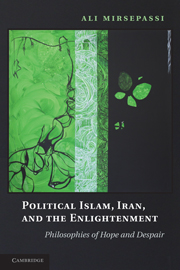Book contents
- Frontmatter
- Contents
- Acknowledgments
- Introduction
- 1 Intellectuals and the Politics of Despair
- 2 The Crisis of the Nativist Imagination
- 3 Modernity beyond Nativism and Universalism
- 4 Heidegger and Iran
- 5 Democracy and Religion in the Thought of John Dewey
- 6 Enlightenment and Moral Politics
- 7 Conclusion
- Notes
- Index
4 - Heidegger and Iran
The Dark Side of Being and Belonging
Published online by Cambridge University Press: 01 March 2011
- Frontmatter
- Contents
- Acknowledgments
- Introduction
- 1 Intellectuals and the Politics of Despair
- 2 The Crisis of the Nativist Imagination
- 3 Modernity beyond Nativism and Universalism
- 4 Heidegger and Iran
- 5 Democracy and Religion in the Thought of John Dewey
- 6 Enlightenment and Moral Politics
- 7 Conclusion
- Notes
- Index
Summary
It is a Heidegger's saying that we become part of what we know and therefore, the only hope for us to be saved from the disease of Westoxification and the contemporary sickening modernity is to understand the true face and spirit of the west.
Ali Shari'atiIn a contemporary Iran where the institutions of the public sphere struggle for their very survival and Iranians yearn for a democratic life, many intellectuals are vigorously prescribing an epistemological revolution. Why is this? At the center of these calls stands the cherished figure of Martin Heidegger, who also happens to have been the leading philosopher of the National Socialist movement in the early 1930s. What is the significance of the Heideggerian philosophical project that such important and influential thinkers as Ahmad Fardid, Jalal Al-e Ahmad, Ali Shari'ati, Dariush Shayegan, and many more recent Iranian intellectuals, in one way or another, are so influenced by it? And why, despite the bitter experience of the past years, do so many still find it viable and important today?
In this chapter we consider and try to map out the nature and the implications of Heidegger's influence in some detail, based on a reading of the seminal work Being and Time as well as several other key writings and recent studies of the thinker and his legacy.
- Type
- Chapter
- Information
- Political Islam, Iran, and the EnlightenmentPhilosophies of Hope and Despair, pp. 85 - 128Publisher: Cambridge University PressPrint publication year: 2010

